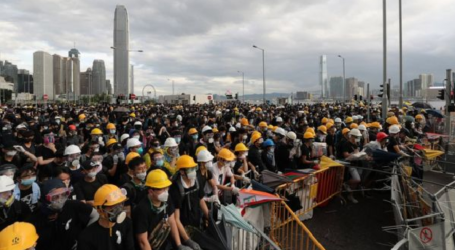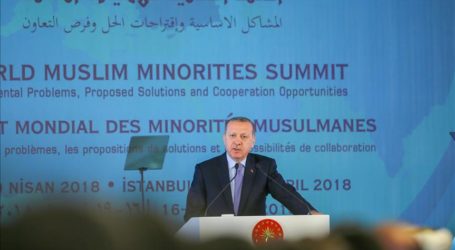UN SLAMS ISRAEL’S POLICY ON AFRICAN MIGRANTS
 Tel Aviv, 4 Rabiul Awal 1435/6 January 2014 (MINA) – The UN High Commissioner for Refugees (UNHCR) has slammed Israel’s policy on African migrants, particularly the new amendment to Tel Avis’s “anti-infiltration law.”
Tel Aviv, 4 Rabiul Awal 1435/6 January 2014 (MINA) – The UN High Commissioner for Refugees (UNHCR) has slammed Israel’s policy on African migrants, particularly the new amendment to Tel Avis’s “anti-infiltration law.”
Israel’s so-called anti-infiltration law allows it to imprison asylum seekers for a long time without charge or deport them to their countries where their lives are often in danger.
In a Sunday press release, the UNHCR said Israel’s new legislation is a violation of the spirit of the UN’s 1951 Refugee Convention, which protects the African refugees from deportation to countries where their lives are imperiled.
The statement said that “the current policy and practices create fear and chaos amongst asylum seekers, not taking into account their specific situation.” Press tv reported as cited by Mi’raj News Agency (MINA).
The agency called on Tel Aviv to consider alternatives to its current “warehousing” of migrants, in likely reference to the Israeli practice of holding African migrants in special facilities.
UNHCR representative in Israel Walpurga Englbrecht also said Israel’s new ‘open’ Holot facility is in fact a detention center for all manners and purposes.
In mid-December, Tel Aviv began operating the facility in Negev to hold African refugees.
“I am particularly disquieted about the purpose of the so-called ‘open’ residence facility in Holot which, in its current form and despite its designation as ‘open,’ would appear to operate as a detention center from where there is no release,” Englbrecht said.
The UN agency had previously criticized the amendments to the Israeli “anti-infiltration law,” and even brought the case before the High Court of Justice, but had not made any public statements in this regard until now.
The statement comes as more than 30,000 African asylum seekers staged demonstrations on Sunday to protest against the implementation of the “anti-infiltration” law.
The demonstrators called for the release of all imprisoned refugees and for the recognition of their rights.
On December 2013, a spokeswoman for Israeli occupation prison services, Sivan Weitzman said on Thursday that around 500 African migrant prisoners were moved to Negev Desert as a new Israeli jail. She added that the number would increase to 1,000 by the end of December.
On Monday, the Israeli parliament, Knesset, approved a law allowing officials to keep African migrant workers in detention facilities without trial for one year. The law also gives Israel the right to send immigrants to complexes called “open facilities” — until they are deported or voluntarily go back to their homelands. Migrants kept in the open facilities will have no right to work.
Critics of the new law have described the open facilities as prisons, predicting the new law will be challenged in the Supreme Court.
More than 50,000 African immigrants, mostly from Sudan and Eritrea, currently work in low-paying jobs in Israel. Orit Marom, a migrant advocate, said that Tel Aviv is using the pressure tactic to make migrants leave Israel voluntarily.
Human Right Watch has said that Tel Aviv used the “threat of prolonged detention” to force the African migrants give up their asylum claims, adding, “Israel should end its unlawful detention policy and release all asylum seekers.”
Israel occupation authority constructed a vast detention facility in the Negev desert to house the thousands of immigrants that cross illegally into Israel from Egypt every year.
Human rights groups fear that the detention centre, the largest of its kind in the world, with a capacity to hold 8,000 migrants, will turn into a festering refugee camp, and deprive those escaping persecution at home of their rights to seek asylum in Israel.
The project was approved by Israel’s right-wing government 18 months ago, but many Israelis are uncomfortable about spurning asylum seekers from war-torn African countries given their own history as a nation of refugees.
“We’ll do all it takes to provide reasonably humane conditions,” an unnamed defence official told. “We all wish we didn’t have to build such a facility. But we’re in a certain situation due to certain circumstances, and we need a facility to address these needs.”
The facility, which will be built on the grounds of Ketziot prison near Israel’s southern border, will accommodate migrants, including women and children, for up to three years before they are deported to their country of origin; those from “enemy” states, such as Sudan, who cannot be repatriated, could be detained indefinitely.
The centre, which will include medical, community and sports facilities, is intended to tackle an immigration problem that politicians say threatens to overwhelm Israel’s population of 7.5 million. Speaking 18 months ago, the Prime Minister, Benjamin Netanyahu, said it was time “to stop this growing influx that threatens Israelis’ jobs and changes the character of the state”.
Every year, thousands of Africans, mostly from Sudan and Eritrea, begin the arduous journey to Israel via the arid Sinai Peninsula, a lawless territory where Bedouin traffickers extract huge fees to smuggle refugees past Egyptian border patrols.
Israel occupation Interior Ministry estimates that 17,000 people crossed the Israel-Egypt border last year, many more than in previous years. They may have been spurred by Israel’s decision to build a sturdy border fence backed up with electronic surveillance equipment. (T/P04/P03)
Mi’raj News Agency (MINA)





